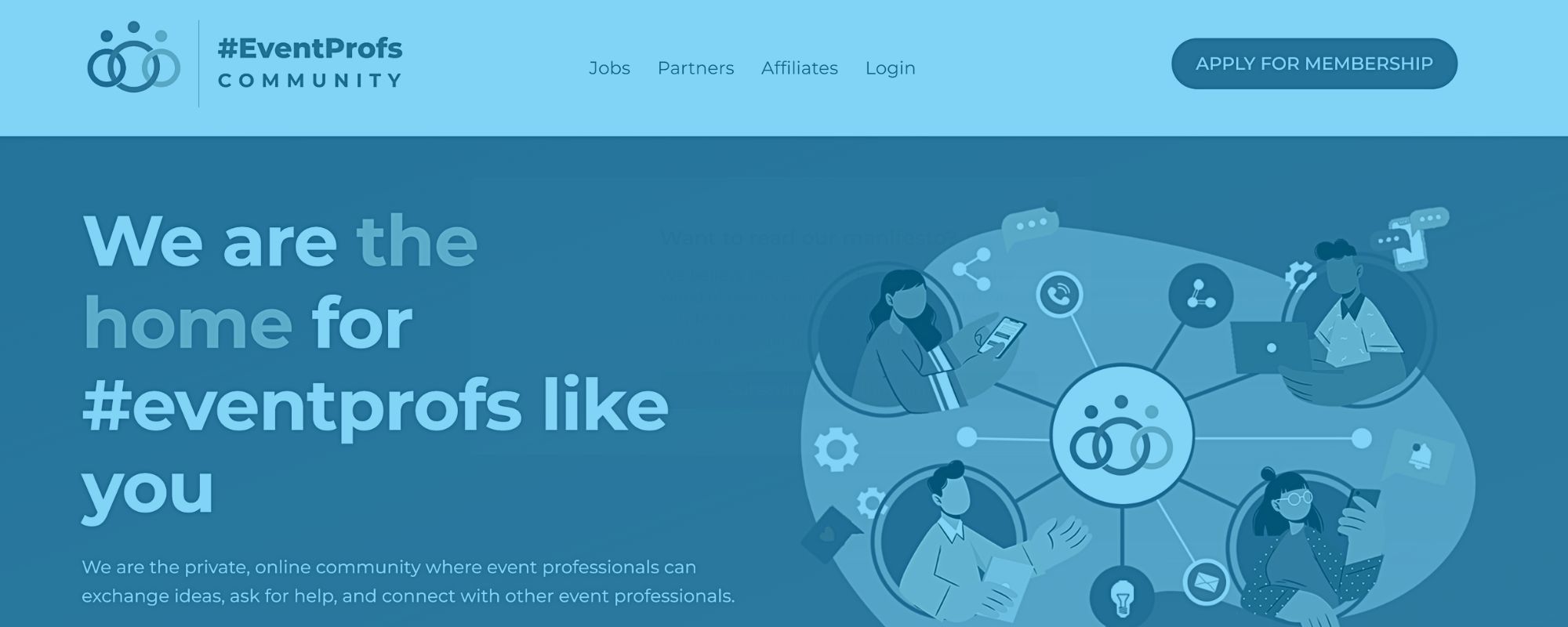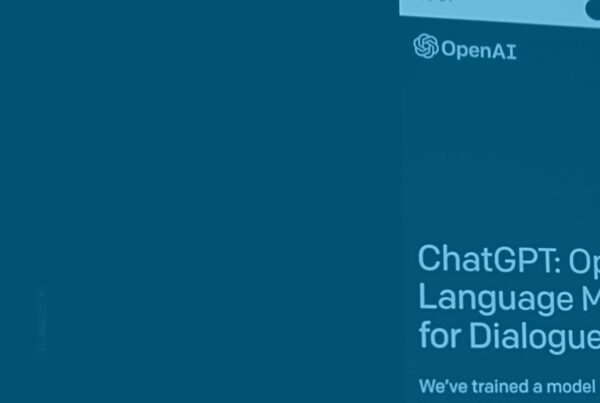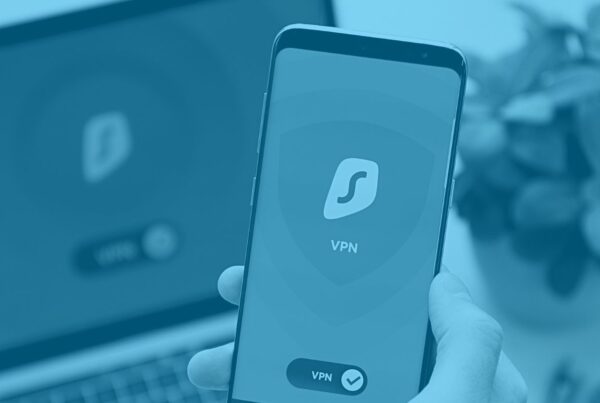The #EventProfs community is a strong network of event professionals who’ve come together worldwide to share their ideas and insights and seek support in the ever-evolving event industry. Our thriving community includes event planners, marketers, sponsors, technology providers, and more, and we’re all committed to improving our craft and the industry. As part of our ongoing commitment to progress and improvement, we’re changing platforms.
In this episode of the Event Tech podcast, Will shares why he’s decided to make the shift, what he’s excited to implement in the new #EventProfs community, which platform the community will use, and what you can expect in the coming weeks and months. Let’s get started!
Where I Was and Where I’m Going
Will begins today’s conversation by starting with his why. “A good place to start with this is: where I was and where I’m going,” he says. “When I started this journey to create the #EventProfs community, we had a Slack group and community meetups, but it wasn’t a community event. I wanted to build an app people would use off social media.”
“Part of my philosophy around this was that whatever platform you use for events can be used as your community platform too. One app that can do it all.” And for a while, event tech platforms seemed to share that vision. “As I talked to event technology platforms, they said this is the future because they saw recurring revenue. But when the rubber met the road, I noticed platforms have moved away from the idea of advertising community as one of their selling features.”
Because event platforms were more focused on the event side, the platforms Will worked with weren’t a perfect match for the community platform he was trying to build. “We are switching from an event app to a platform designed for communities and only for communities,” explains Will. “I used to think community platforms suck at doing events. But you know what, I’m realizing event apps suck at doing community.” His new philosophy: pick applications that focus on doing one thing well rather than one app that tries to do it all.
The #EventProfs Community Needs More from its Platform
Over the years, the #EventProfs community has grown larger than Will could have imagined. As a result of such tremendous growth, he’s started seeking more community-focused features in a new platform. Here’s what he didn’t like about the previous platform and what he’s looking for moving forward.
1. Recurring Payments
“Let’s talk about things I didn’t consider when I started building this community. The first thing that came to mind was managing people coming in. Many event platforms are designed like an event,” says Will. However, communities last much longer than a typical 7-day event. “You start putting 365 days on the calendar, and the UI doesn’t become that easy to work with.”
“So I wanted a way to do things like recurring, monthly, quarterly, and annual billing,” he continues. With events, you buy the ticket once, and you’re done. “I would have had to build an entire third-party Stripe integration with Zapier to manage the members. So if you’re using an event app as your community app, keep in mind that if you plan on making that community paid, it won’t be easy. That was my first learning.”
2. Post and Comment Limits
Another thing to note, event apps don’t always allow for an in-depth conversation on the platform. “As people start posting stuff on the main feed, you have to make sure that experience is world-class,” explains Will. “There was a character limit on our platform, both in posts and comments. I thought to myself, ‘Not a big deal. This will get fixed.’ But I realized it prevented members from having real in-depth conversations. I think it frustrated some people not to want to come back.”
3. Recurring Calendar Events
For most event apps, when you put events on a calendar, they break your schedule down day by day. “When you do 365 days, you literally have 365 days on the calendar, and you have to click through them all,” says Will.
“Another critical feature that proved challenging was adding new events. “That’s the core part of an event app. Sometimes it’s so elaborate to add an event that it was almost a pain in the ass to reschedule them.” And by rescheduling, Will means scheduling recurring events (like the live recording of this Event Tech podcast episode). “You can’t do that. It wants a description, a header image, who the speakers are, and who the sponsor is. It asks so many questions. I think there’s a big need for the ability to generate events and get them up and running quickly.”
4. Notification Strategy
Last but not least, the #EventProfs community needed a notification strategy. Without it, engagement suffers, and event platforms aren’t built to engage attendees 365 days a year.
“We had a whole episode where we talked about why I thought push notifications were the best,” says Will. Our former platform could handle “one-off push notifications and things like that. But simple notifications like letting you know there’s a new post, a new partner, or someone commented or viewed your profile, and people didn’t get notifications. So we had to push notifications for everything manually. We needed another email management tool to do those things.”
“The feature I’m excited about with the new platform is a weekly digest that says here’s what you missed since you last logged in. The community platform has it, but event apps don’t. And it is because you don’t need a weekly recap when your events are only a week long. Not having notifications to bring you back into the platform killed our engagement. It’s so easy to miss stuff without a notification strategy.”
Circle: #EventProfs new Community Platform
Now, it’s time to share which platform our community will use. “We’re switching to a platform called Circle,” shares Will. “I had a strong belief that event apps could become community apps. As I started looking into Circle, so many features made it much easier. So I’ll go into features and kick it over to Brandt for initial impressions.”
“The first feature is Weekly Digest. It shares all the posts you’ve missed, new members, and can include stats.” Second, “everything inside the platform is triggerable. I can create new posts in the platform based on Zapier triggers. I can DM members with integrations and can do things like tag people and organize them.”
“One big reason we want to switch over is paywall features. We are switching to a paid model with the community. We have to make this sustainable. They integrate with Stripe. I can set up trials and do daily, weekly, monthly, or quarterly.” Will can also offer discount codes. “I can offer your first month free. It’s incredible what you can do.”
Will continues: “The thing that makes Circle most incredible is the feed features. The way content gets organized is so much better.” Initially, Will didn’t think the community would be so big that it would need multiple feeds. “But honestly, I think it got to the point where people were not engaging because there was only one feed to post on. So what’s great about Circle is having dedicated spaces where people can have conversations.” For example, #EventProfs can have a dedicated space for vendors, contractors, and CEOs. Event professionals and event tech experts can each have their own spaces, creating a more intimate experience for everyone.
Brandt’s Initial Impressions
Will’s decision to move the community to Circle is recent, so Brandt is new to its features. Here are his unfiltered first impressions.
“I’m going to start with a little negative,” begins Brandt. “I’m typing in my bio, and as soon as you move on to the next thing, you get the bio is too long. There’s no countdown like on Twitter. The last thing you want is to spend 20 minutes crafting the perfect bio, and then it says it’s too long. This is stuff we see on social media platforms all the time. So I chopped it in half, and now it’s 301 characters, so I have to get it down even further. These little hiccups start to add up.”
Switching to something he likes about the platform, Brandt shares his thoughts on Circle’s “actions.” When users join the platform, it prompts them to share certain things about themselves. “You’ve already got my mind going, as opposed to starting from a blank page. You’ve primed the pump. That’s part of the software.”
“All the basics you expect to find in these kinds of things. It feels kind of like Slack or Discord,” adds Brandt. “We have announcements, events, upcoming events, a whole link section. There’s an iOS app and an Android app. You can also refer friends for money and purchase #EventProfs merch. First impressions, it’s easy to navigate.”
Another cool feature on the platform is the wiki. “It allows you to start building a wiki inside your community,” says Will. “This was a challenge in the event apps. You can start to build a resource and knowledge center inside your community. That’s where I think the real long-term value starts. When people start giving tutorials and ideas, you want them to live more than in just the feed. This allows it to become an asset that people pay for and get excited about.”
“One last thing, you can have different levels of membership,” adds Will. “For example, let’s say I wanted to make it so there’s a VIP level you can pay extra for and access five additional categories no one else sees. You can start gating different parts of the experience. You can even do gated event calendars too. There’s a lot of possibilities.”
Final Thoughts
Excited to have brought Event Tech podcast listeners behind the scenes, Will begins to wrap up the episode. “I’ve always envisioned us being a mega online community that encompasses every single part of the industry. Imagine PCMA had its own section; NPI has its own section. Just all ideas I wanted to share. I’m glad you like it.” If you want to check out the #EventProfs community, join us! We offer a 90-day money-back guarantee. As always, we’d love to hear your feedback. What would you like to see in the community? And what features are you most excited about? Email us. We’ll catch you here next time for another episode of the Event Tech podcast.








